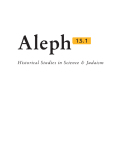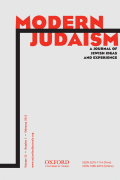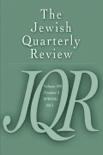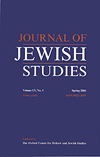
Review of Rabbinic Judaism
Scope & Guideline
Charting the Evolution of Rabbinic Judaism
Introduction
Aims and Scopes
- Rabbinic Literature Analysis:
The journal provides a deep dive into Rabbinic texts, examining their interpretations, implications, and contextual backgrounds within Jewish history. - Interreligious Polemics and Dialogue:
A significant focus on the interactions and theological debates between Judaism and other religions, particularly Christianity and Islam, highlighting historical and contemporary implications. - Historical Contextualization:
Articles frequently contextualize Rabbinic thought within specific historical periods, exploring how socio-political factors influenced religious practices and beliefs. - Cultural and Social Studies:
The journal explores the cultural dimensions of Judaism, including the impact of Jewish traditions on social structures and identity, particularly in diasporic communities. - Women in Judaism:
There is a notable emphasis on the roles and representations of women in Rabbinic literature, addressing gender dynamics within religious practices and interpretations. - Methodological Innovations:
The journal encourages novel methodological approaches to the study of Rabbinic texts, including linguistic, literary, and philosophical analyses.
Trending and Emerging
- Jewish Identity in Modern Contexts:
Recent publications increasingly explore themes of Jewish identity, particularly in relation to diaspora experiences and modernity, reflecting a growing interest in how traditional beliefs adapt to contemporary realities. - Gender and Feminist Perspectives:
There is a notable rise in articles that examine gender roles and feminist interpretations within Rabbinic literature, highlighting the evolving discourse around women's roles in Judaism. - Cultural Memory and the Holocaust:
Scholarly focus on the Holocaust's impact on Jewish culture and memory is growing, as evidenced by discussions on memorialization and the significance of texts annihilated during this period. - Interdisciplinary Approaches:
Emerging themes indicate a trend towards interdisciplinary studies that incorporate insights from sociology, literature, and cultural studies to enrich the analysis of Rabbinic texts. - Contemporary Ethical Issues:
A rising interest in addressing contemporary ethical dilemmas through the lens of Rabbinic thought is evident, reflecting a desire to connect historical texts with modern moral questions.
Declining or Waning
- Early Halakhic Discussions:
Topics surrounding the foundational Halakhic discussions from the early Rabbinic period appear less frequently, indicating a possible waning interest in historical legal debates compared to contemporary applications. - Traditional Jewish Rituals:
Studies centered exclusively on traditional rituals without a critical or contextual analysis are becoming less prominent, suggesting a move towards more integrative approaches that consider modern implications. - Static Historical Narratives:
There is a decline in articles that present static or uncritical historical narratives, as scholars increasingly seek dynamic interpretations that engage with contemporary issues. - Narrowly Focused Textual Studies:
Research that focuses solely on isolated texts without broader contextual or thematic connections is becoming less frequent, indicating a shift towards interdisciplinary studies.
Similar Journals

Quest-Issues in Contemporary Jewish History
Empowering Research in the Landscape of Jewish StudiesQuest - Issues in Contemporary Jewish History is a pivotal open-access journal published by the Fondazione Centro Documentazione Ebraica Contemporanea in Italy. Since its inception in 2010, this journal has been dedicated to the scholarly exploration of the multifaceted dimensions of contemporary Jewish history, making significant contributions to the fields of history and cultural studies. With an ISSN of 2037-741X, it serves as a vital platform for researchers, professionals, and students alike, providing access to an array of insightful articles and research findings. As of 2023, it holds a respectable Q3 ranking in the History category within Scopus, indicating its growing influence in academia, alongside a rank of #899 out of 1760 in Arts and Humanities – History. This makes it an essential resource for those looking to deepen their understanding of Jewish history in a contemporary context. The journal, with its rich scholarly outputs converging from 2017 to 2023, is based in Milan and strives to foster high-quality research in Jewish studies.

European Journal of Jewish Studies
Unveiling New Perspectives on Jewish Heritage and ScholarshipEuropean Journal of Jewish Studies is a distinguished academic publication that offers a comprehensive platform for scholarly inquiry into Jewish studies, addressing critical intersections with cultural studies, history, literature, and religious studies. Published by BRILL, a leading academic publisher based in the Netherlands, this journal boasts a robust reputation supported by its impressive rankings and quartile classifications—Q3 in Cultural Studies, Q3 in History, Q2 in Literature and Literary Theory, and Q3 in Religious Studies as of 2023. With its convergence years spanning from 2007 to 2024, the journal serves as a vital repository of research that navigates the complexities of Jewish identity and culture through interdisciplinary lenses. Although it does not operate under an open access model, the journal's rigorous peer-review process ensures the publication of high-quality research essential for students, professionals, and academics alike. Engaging with this journal opens up pathways for critical dialogue and innovative contributions to the field, making it an essential resource for those invested in the rich tapestry of Jewish studies.

Tradition-A Journal of Orthodox Jewish Thought
Engaging Minds, Enriching TraditionTradition: A Journal of Orthodox Jewish Thought is a prestigious academic journal published by the Rabbinical Council of America, dedicated to the exploration and analysis of Orthodox Jewish thought and its implications on contemporary issues. With a legacy dating back to 1973, this journal serves as a crucial platform for scholars, theologians, and students interested in the rich tapestry of Jewish philosophy, law, and ethics. Although it does not offer open access, its thoughtful, peer-reviewed articles are essential for advancing knowledge in Jewish academia and fostering dialogue within the broader cultural context. As an authoritative voice in the field, Tradition invites submissions that challenge, inform, and inspire further inquiry into the complexities of Jewish tradition, ensuring that it remains at the forefront of scholarly discussion.

Kwartalnik Historii Zydow-Jewish History Quarterly
Exploring the Rich Tapestry of Jewish HeritageKwartalnik Historii Żydów - Jewish History Quarterly is a dedicated academic journal published by the esteemed Jewish Historical Institute in Warsaw, Poland. With an ISSN of 1899-3044, this quarterly publication serves as a vital platform for scholarly discourse on Jewish history, culture, and heritage. The journal aims to reflect the diversity and complexity of Jewish experiences across historical contexts, making it an essential resource for researchers, professionals, and students in the fields of History, Religious Studies, and Cultural Studies. Despite its recent coverage discontinuation in Scopus from 2012 to 2015, the journal's rankings within its respective categories indicate a modestly engaged readership and potential for contribution, particularly seen in its ranks of 339/388 in Religious Studies and 859/975 in History. Although the journal operates on a non-open access basis, its curated articles enrich the understanding of Jewish narratives and interactions within broader socio-cultural frameworks, underlining its importance in promoting historical knowledge and cultural appreciation.

Aleph-Historical Studies in Science & Judaism
Advancing Understanding of Science Through a Jewish LensAleph-Historical Studies in Science & Judaism, published by Indiana University Press, is a pivotal journal at the intersection of history, religious studies, and the philosophy of science. With an ISSN of 1565-1525 and an E-ISSN of 1565-5423, this journal has gained recognition for its insightful exploration of the complex relationships between scientific practice and Jewish thought from 2009 to 2023. Operating from the heart of the United States, Aleph currently holds a Q4 category ranking in History, History and Philosophy of Science, and Religious Studies, reflecting a growing interest in its unique contributions to these fields. Notably, it ranks within the 79th percentile in Arts and Humanities History and Religious Studies, underscoring its significance in advancing scholarly dialogue. Although currently not an Open Access journal, it remains an essential resource for researchers, professionals, and students dedicated to uncovering the narratives that shape our understanding of science and religion.

Dinbilimleri Akademik Arastirma Dergisi-Journal of Academic Research in Religious Sciences
Cultivating a deeper understanding of belief systems.Dinbilimleri Akademik Arastirma Dergisi - Journal of Academic Research in Religious Sciences is a distinguished periodical dedicated to advancing the field of religious studies through rigorous academic research. Published by DINBILIMLERI AKAD ARASTIRMA MERKEZI, this journal fosters scholarly dialogue and dissemination of knowledge, making it an essential resource for researchers, professionals, and students alike. With its ISSN 1303-9199, the journal is committed to providing open access to its rich array of articles, ensuring that valuable insights and findings in religious sciences are widely available. Located at Ondokuz Mayıs University in Samsun, Turkey, this journal contributes significantly to the academic landscape by offering critical examinations of contemporary and historical issues in religion. Emphasizing quality and relevance, the journal aspires to facilitate a deeper understanding of religious phenomena in our increasingly interconnected world.

MODERN JUDAISM
Cultivating Insight into Jewish Culture and SocietyMODERN JUDAISM is a premier journal dedicated to the multifaceted exploration of Jewish culture, history, and religious practice, providing a significant platform for scholarly discourse since its inception in 1981. Published by Oxford University Press Inc in the United States, this journal stands out with its diverse engagement across disciplines, reflected in its commendable 2023 category quartiles: Q2 in Cultural Studies and History, Q1 in Religious Studies, and notable rankings in Political Science and Sociology. With an impact factor that underscores its rigorous peer-review process and scholarly relevance, MODERN JUDAISM serves as an essential resource for researchers, professionals, and students alike, fostering an academic environment conducive to innovative ideas and comprehensive studies. Although not open access, the journal remains crucial for anyone looking to deepen their understanding of contemporary Jewish thought and its intersection with broader cultural and political currents. For further inquiry or submissions, please refer to the Journals Department at 2001 Evans Rd, Cary, NC 27513.

JEWISH QUARTERLY REVIEW
Illuminating Jewish Thought Through Rigorous AnalysisJewish Quarterly Review, published by University of Pennsylvania Press, is a distinguished academic journal that delves into the multifaceted realms of Jewish culture, history, and religious studies. With a rich publication history dating back to 1953 and an impressive track record of rigorous scholarship, this journal maintains a Q2 ranking in key categories such as Cultural Studies, History, and Religious Studies in 2023, placing it among the top-tier journals in its field. The ISSN number 0021-6682 and the E-ISSN 1553-0604 ensure that its scholarship is widely accessible and traceable in academic databases. While the journal is not open access, it remains an essential resource for researchers, professionals, and students seeking in-depth analysis and perspectives on Jewish thought and heritage. The JQR is known for its editorial commitment to enhancing understanding and dialogue across cultural and historical contexts, making it an invaluable asset for anyone engaged in Jewish studies and related disciplines. With its headquarters in Philadelphia, PA, the journal continues to foster scholarly engagement and critical discourse on Jewish identity and experience through its carefully curated articles and reviews.

JOURNAL OF JEWISH STUDIES
Illuminating Jewish History and CultureJOURNAL OF JEWISH STUDIES, published by the Oxford Centre for Hebrew and Jewish Studies, stands as a distinguished platform for scholarly discourse in the fields of Jewish history, culture, literature, and religious studies. With its ISSN 0022-2097, this journal is recognized for its significant contributions to understanding Jewish heritage and thought, achieving commendable rankings in various categories, including Q1 in Literature and Literary Theory and Q2 in History and Cultural Studies, as of 2023. The journal fosters rigorous academic engagement and encourages researchers and scholars worldwide to explore the complexities of Jewish identity and its interconnections with broader historical narratives. Operating without an open access model, it nonetheless ensures a wide reach through its well-regarded reputation, making it an essential resource for anyone invested in Jewish studies. With a publication history spanning from 2002 to 2024, the journal continues to serve as an invaluable repository of knowledge and insight for students, researchers, and professionals alike.

Judaica Bohemiae
Fostering Connections Through Rigorous Academic DiscourseJudaica Bohemiae, published by the Zidovske Muzeum Praze, is a prominent scholarly journal dedicated to the study of Jewish culture, history, and religious practices, with a particular focus on the Czech Republic and Central Europe. Since its relaunch in 2007, the journal has established itself as a valuable resource in the fields of Cultural Studies, History, and Religious Studies, achieving a commendable Q2 ranking across these disciplines in 2023. With its thoughtful compilation of research articles and critical essays, Judaica Bohemiae offers insights into the evolving dynamics of Jewish existence and identity. Although it does not currently operate under an open access model, the journal ensures that its high-quality content remains accessible to researchers, professionals, and students interested in the nuanced intersections of culture and history. By promoting rigorous academic discourse and advancing the understanding of Jewish heritage, Judaica Bohemiae continues to play a crucial role in its field, fostering scholarly connections and illuminating the past for future generations.